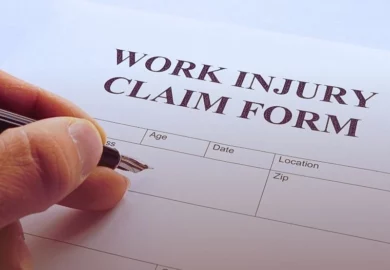What are the requirements for workers’ compensation eligibility? After a work-related injury or illness, employees in Illinois can recover compensation through a workers’ compensation claim if they meet all eligibility requirements. There are multiple elements you must consider to successfully file a claim and secure total coverage for your injuries.
Table of Contents

Here, you’ll learn more about the eligibility requirements for workers’ compensation in Illinois, along with the types of benefits you may recover through a claim.
Eligibility Requirements in Illinois for Workers’ Compensation
You may open a workers’ compensation claim for work-related injuries or illnesses as long as you meet the state’s eligibility requirements.
The following are some considerations when determining whether you qualify to recover workers’ compensation benefits from an employer.
Employee Classification
Most employees in Illinois are able to recover compensation from employers if they develop a work-related injury or illness. However, there are exceptions that prevent employees from opening a claim.
While business owners and others must carry workers’ comp insurance to cover employees, sole proprietors, business partners, and some others are exempt from this coverage. Independent contractors working as freelancers for employers typically don’t have access to workers’ comp benefits either.
The Nature of the Injury
To succeed with a workers’ compensation claim, you must show that your injury or illness developed within the scope of your employment. For example, you may not qualify for a workers’ comp claim if your injury occurred outside the workplace or while off the clock. Conversely, you could be eligible for compensation even if your injury developed off-site, if it occurred while acting on behalf of your employer.
Medical Care
Another requirement is medical care from approved professionals. In Illinois, employers will normally provide employees with a list of approved medical providers that fall under the workers’ compensation insurance plan. Failure to seek diagnosis or treatment from these professionals could affect your ability to recover compensation from employers.
When Does an Injury Qualify for Workers’ Compensation?
To succeed with a workers’ comp claim, you must prove a primary injury, prove a secondary injury, or prove an illness that developed on the job. There are many injuries and illnesses that can develop in the scope of work, qualifying an employee for a claim.
Physical Injuries Resulting From Work Place Accidents
Many work-related injuries can develop on the job and warrant workers’ compensation claims.
Some examples of common workplace accidents include:
- Struck by objects: Mobile or idle objects could strike workers and cause mild to severe injuries in the workplace. Often, these injuries result when employees come into contact with objects, such as equipment, tools, and tumbling warehouse stock.
- Slip and fall accidents: Slippery or uneven surfaces could also cause employees to slip and fall onto the floor, resulting in sprains, cuts, scrapes, broken bones, and other injuries.
- Electrocution: In environments with electrical hazards, employees could suffer electrocution injuries. Often, these injuries occur when workers operate near or on power lines.
- Car and truck accidents: Employees could sustain work-related injuries outside the workplace when driving, such as when delivering products to customers. They may get into accidents involving other negligent drivers or when in a rush due to pressure from employers, among other causes.
- Overexertion injuries: Another injury that employees may suffer pertains to overexertion or exhaustion. If employees suffer overexertion, they may pull or tear muscles or sustain other injuries due to physical stress. Meanwhile, exhaustion can cause fatigue that leads employees to make mistakes they would otherwise avoid when awake and alert.
These are simply some of the many types of work-related injuries that employees could sustain on the job, whether on- or off-site.
Occupational Diseases and Exposure-Related Illnesses
In addition to injuries, workers could suffer various illnesses resulting from dangerous work. These diseases tend to develop over time, whether due to short or long-term exposure to toxic chemicals, illnesses, or other factors.
Some occupational diseases and illnesses include asthma and other respiratory diseases, asbestosis, cancer, skin diseases, musculoskeletal disorders, contagious illnesses such as viruses or bacterial infections, inflammation, and poisoning.
It can be difficult to prove work-related illnesses in many cases, especially if the direct cause is hard to pin down after years of exposure. However, workers’ compensation lawyers can help show how environmental factors contribute to an illness.
Types of Workers’ Comp Benefits
The following is a brief breakdown of the four types of workers’ compensation benefits you may recover:
Medical Costs
One of the primary types of benefits you may recover in a workers’ comp claim applies to medical expenses. These benefits cover the financial losses sustained because of your injuries, including ambulance rides, hospitalization, diagnostic tests, and immediate and ongoing care.
Disability Benefits
You could recover disability benefits if you suffered a disability because of your injury or illness. The four main types of disability benefits include temporary partial disability (TPD), temporary total disability (TTD), permanent partial disability (PPD), and permanent total disability (PTD) benefits. These benefits will vary based on the degree of your disability, whether you’re unable to return to work in the same or any capacity, and how long your incapacitation lasts.
Occupational Rehabilitation Benefits
Following an injury or illness, you may need rehabilitation to return to work, whether in the same capacity as before the condition or under new limiting circumstances. Occupational rehabilitation can help injured or ill workers find employment with another employer in Illinois.
These benefits will cover the costs of physical therapy, rehabilitation, and other forms of care that help you return to your former occupation or enter a new one.
Workers’ Compensation Death Benefits
If an employee dies because of his or her work-related injury or illness, the victim’s family can recover compensation via death benefits. These could cover the aforementioned medical costs and disability expenses while the worker was still alive, along with costs related to his or her death, such as funeral and burial expenses, and lost income.
If you need help determining what benefits are available to you, get assistance from an experienced workers’ comp lawyer in Illinois. The right attorney can help identify and calculate benefits that apply to your case, collect evidence proving the nature of your injuries or illness, and work to recover total compensation as quickly as possible to meet your medical and financial needs.
What Are the Reporting and Filing Requirements for Workers’ Compensation in Illinois?
To succeed with a workers’ comp claim, you must meet Illinois’s reporting and filing requirements. Specifically, you have a designated amount of time to initiate a claim and steps you must take to begin the claims process.
The first consideration here is the need to report your injury to your employer. As soon as you discover a work-related injury or illness, you must to your employer in written form. A formal report will indicate the nature of your injury and help the employer and insurer determine whether you have a valid claim.
Time Limits for Reporting a Workplace Injury and Illness
The deadline to report a work-related injury or illness in Illinois is 45 days from the date of the injury or the discovery of a work-related injury or illness. To maximize your chances of succeeding with a case in this state, you should notify your employer as soon as possible to begin the claims process.
However, employers also have a limited amount of time to provide a response after you report your condition. Illinois specifically gives employers 14 days to either approve or deny a claim.
Meeting the Eligibility Requirements for Workers’ Comp
By taking the right approach to your case and meeting all eligibility requirements in Illinois, you may maximize your chances of successfully recovering compensation through a workers’ comp claim.
You must prove that you sustained a work-related injury or illness, report your condition on time, and determine what kinds of benefits you’re able to recover to succeed with your claim. A good lawyer can help with all of this as you work to build your case, giving you the representation you need to communicate with employers and negotiate a claim with insurers.



